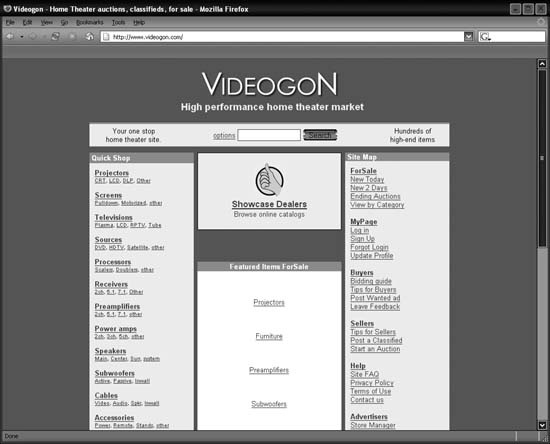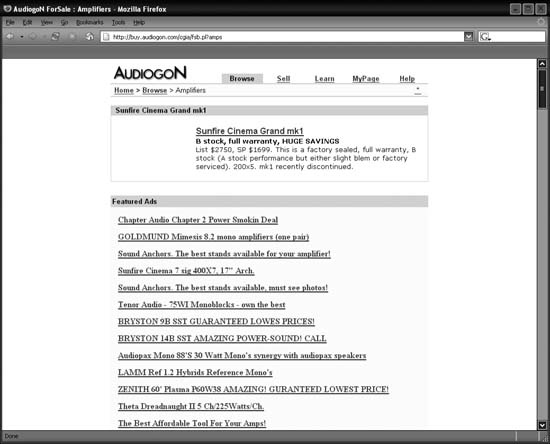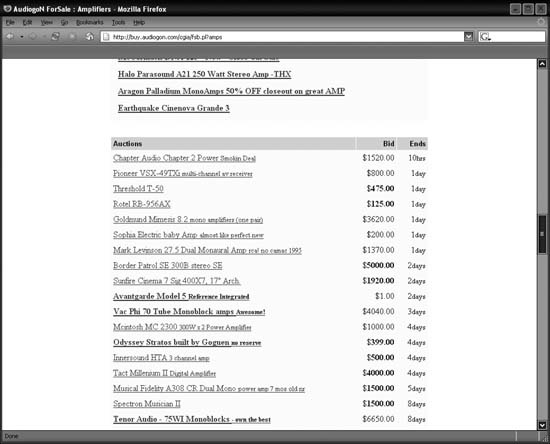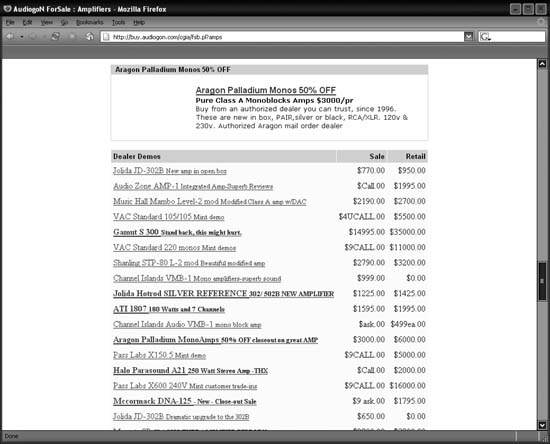Online sites such as audiogon.com and videogon.com provide high-end gear, both new and used, at low prices.
So, here's the basic problem: you don't have a good boutique [Hack #4] nearby; you hate the chain stores (and their selection is terrible) [Hack #3] ; and eBay [Hack #5] doesn't offer the really high-end gear you're looking for. This is actually a common situation (I'm in it myself, for what it's worth), and thankfully there's a solution. There are a couple of high-end online sites that offer even the most unusual gear, at less-than-factory prices.
- Audiogon
Housed at http://www.audiogon.com, this is the original site for killer equipment online. Audiogon has lots of home theater gear, but caters to the stereo (two-channel music) crowd as well.
- Videogon
Videogon is a follow-on to Audiogon, and is online at http://www.videogon.com. Videogon is more squarely focused at home theater, and is probably where you want to start if you're intoâ¦wellâ¦what this book is about.
Tip
Just in passing, there's also a high-end camera marketplace at http://www.photogon.com.
You'll find everything from the standard fare seen on eBay to $20,000 components on these sites; needless to say, you won't be limited in selection.
There's also a nice network of reviews that will help you find just the right gear for your particular system.
Both of these sites have essentially the same navigation. The main page (shown in Figure 1-8) has a listing of categories down the left. You also have subcategories to choose from. However, I often find things miscategorized (or not placed in a subcategory at all), so stick with the main headings and work from there.
Once you drill down into a category, you'll see a list of featured ads (see Figure 1-9), auctions (seen in Figure 1-10), and finally, dealer demo listings (Figure 1-11). Each area is worth some investigation, as long as you know what to watch out for.
The high-end sites have auctions, just like eBay [Hack #5] . Howeverâunlike eBayâyou don't have the same robust set of protections on your purchases. There is not a well-established recourse for filing grievances, there is no safe harbor, no escrow, no feedback⦠you get the idea. Although these sites include many items that you simply can't find on eBay, you should exercise real caution. You also should start by reading the terms of use: http://cgi.audiogon.com/auction/rulesauc.html.
Tip
Realize that I'm not ragging on the auction system at these sites; I'm just saying you might want to take a few extra steps as their infrastructure develops.
The best way to reduce risk, though, is not to simply bail on any gear up for auction. In fact, that would defeat much of the value of these sites. Instead, go back to "old school" eBay tactics. In the early days of eBay, it was common to trade 5 or 10 emails, and often to have a phone call, with a seller during a transaction (at least, that's the way I did things). Although this won't guarantee you will avoid any charlatans, it certainly will help you avoid a lot of bad situations.
Finally, follow all the tips outlined in working with an eBay seller [Hack #5] . Request pictures, get details, go the whole nine yards. Additionally, you can ask the seller if he has done any business on eBay. If he has, get a user ID and check his feedback. This is just one more step in making sure you get the best gear, at the best price, in the best condition.
Many of the listings on Audiogon and Videogon have a "sale" price and a retail price. This is pretty typical fare for sites such as these; the retail price always is much higher than the sale price, which makes you feel like you're getting some sort of deal if you buy. That said, you should realize retail prices are absolutely useless. Even the manufacturer inflates its retail prices; certainly you realize that even dealers don't sell gear at retail, don't you? So, never get too excited just because a sale price is some huge percentage off "retail."
The best way to figure out if you're getting a good deal is to hunt around. Most popular items have multiple listings, and you can compare listings to see what the street price is. Another good idea is to see if you can find the item being sold in a brick-and-mortar store, and call that store for a price quote. Even if you can't find a local store, this technique will help you determine if the price online is reasonable. As a general rule, buying direct from someone online should save you at least 10% to 15% off of buying it in person, and you avoid taxes in most cases.
One of the real steals at sites such as Audiogon are the dealer listings. This might come as a surprise; I actually ignored these for the first several months of shopping online. Typically, dealer demos are like web site ads; you just want to click through them and make them go away. This couldn't be further from the case, though, at these high-end sites. First, you'll often find dealer demo units. These are units that have been shown on the floor, or perhaps have been opened up or are surplus stock. In almost all cases, though, these units are new and are in great condition, but have below-market prices. You'll also find some dealers just advertise regular stock on these sites to attract business.
Whatever the situation, you need to call these dealers and ask them for their pricing. Equipment manufacturers (especially the high-end ones) have very restrictive agreements with their dealers as to what prices can be listed.
However, a phone call might reveal that a dealer is willing to go far below what he can legally list a unit at.
Tip
For the ultraparanoid, this isn't illegal. It's just a technicality you find in areas like this. The same applies, incidentally, for many high-end guitar builders, including Martin, Taylor, and Collings.
As a point of reference, I was shopping for a Lexicon MC-12. These listed at about $10,000 at the time, and the best you could buy them used on eBay was for around six grand. I called up a dealer I found on Audiogon, and he offered me a new unit at just over $4,500! This wasn't even B-stock or a refurb; it was a new, never-been-opened unit, and I got it at well below used prices. Needless to say, I've been back to that dealer many times, and I've found the same paradigm (albeit not always at such a drastic savings) is in effect all over the place. Five minutes on the phone have saved me thousands and thousands of dollars over the years.
Get Home Theater Hacks now with the O’Reilly learning platform.
O’Reilly members experience books, live events, courses curated by job role, and more from O’Reilly and nearly 200 top publishers.





